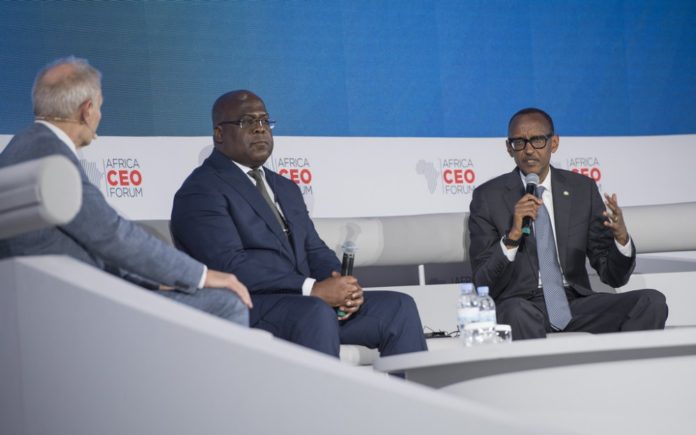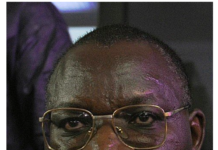By Arnold Gakuba
After two years and four months heading the vast country of DRC, President Felix Antoine Tshisekedi is witnessing a new style of governance completely different from those of his predecessors. This new regional governance seems to be surprising given that he had started managing the state as other presidents and any change was expected from him considered his political background; but from now on he is revolutionizing the policies of the great lake region where the President Kagame in power since soon 30 years was manifesting inclinations to impose himself as a king of the region thanks to the pitiful policy of lies.
Who is Félix Antoine Tshisekedi Tshilombo?
Félix Antoine Tshisekedi Tshilombo born 13 June 1963 is a Congolese politician who has been the President of the Democratic Republic of the Congo since 25 January 2019. He is the leader of the Union for Democracy and Social Progress (UDPS), the DRC’s oldest and largest party, succeeding his late father Étienne Tshisekedi in that role, a three-time Prime Minister of Zaire and opposition leader during the reign of Mobutu Sese Seko. Tshisekedi was the UDPS party’s candidate for president in the December 2018 general election, which he won, despite accusations of irregularities from several election monitoring organisations and other opposition parties. The Constitutional Court of the DRC upheld his victory after another opposition politician, Martin Fayulu, challenged the result, but Tshisekedi has been accused of making a deal with his predecessor, Joseph Kabila. The election marked the first peaceful transition of power since the state became independent from Belgium in 1960.
Since the Common Front for Congo (FCC) coalition, which is aligned with Kabila, still controlled the parliament and provincial governorships, Tshisekedi’s ability to govern or even appoint a new Prime Minister was limited for the first six months of his term. He named his coalition partner and political heavyweight, Vital Kamerhe, as his Chief of Cabinet, at first having designated him prime minister but not having the parliamentary support to get him appointed. In May 2019 he arrived at a deal with the parliament’s Kabila-aligned majority to appoint Sylvestre Ilunga prime minister. On July 27, 2019, negotiations finally ended between Tshisekedi and the parliament, agreeing on the formation of a new cabinet.
Political career
In late 2008, Tshisekedi was named the UDPS National Secretary for external relations. In November 2011, he obtained a seat in the National Assembly, representing the city of Mbuji Mayi in Kasai-Oriental province. He did not take his seat, citing a fraudulent election, and his mandate was invalidated for “absenteeism”.
In May 2013, he refused a position of rapporteur at the Independent National Electoral Commission (CENI), saying that he did not want to put his political career on hold[10] as CENI’s article 17 excludes membership for those who are members of a political formation.
In October 2016, Tshisekedi became vice secretary general of the UDPS. On 31 March 2018, he was elected to lead the UDPS, after his father’s death on 1 February 2017. The same day, the UDPS nominated him for president in the December 2018 general election.
On 10 January 2019, it was announced that Tshisekedi had won the presidency of the DRC in the December 2018 election. He defeated another opposition leader, Martin Fayulu, and Emmanuel Ramazani Shadary, who was supported by term-limited outgoing President Kabila, who had been president for 18 years. Fayulu, the runner-up, alleged rigging and challenged the election results. On 19 January, the Constitutional Court, dismissed the challenge, officially making Tshisekedi president-elect. He was sworn in as president on 24 January 2019, taking office the next day. This marked the first time since the Congo gained independence in 1960 that an incumbent president peacefully transferred power to the opposition.
On 20 January, South Africa congratulated Tshisekedi on his election despite the African Union and EU warning of doubts over the result announced by the Constitutional Court. After Tshisekedi was sworn in, it was reported that a member of Kabila’s coalition would be picked to serve as his Prime Minister.
On 13 March 2019, Tshisekedi signed a decree to pardon approximately 700 prisoners, including imprisoned political opponents of Kabila, and this decision followed his promise to allow the return of exiles given the week before.
In early 2019, negotiations were underway between Tshisekedi and Kabila’s FCC coalition that controlled the National Assembly and Senate. In late April, Jeune Afrique reported that Kabila proposed to Tshisekedi the mining company executive Albert Yuma as a candidate for prime minister. Yuma supports the new Mining Code adopted in 2018, which put the DRC in dispute with international mining companies, and Tshisekedi has been under foreign pressure to not appoint him. The Civil Society of South Kivu recommended to Tshisekedi the appointment of his chief of staff Vital Kamerhe as prime minister. For months, Tshisekedi continued working with ministers of Kabila’s government as he was hamstrung by parliament. He faced challenges in dealing with the Kivu conflict as well as the Ebola outbreak in the region. In early March, Tshisekedi started a program to improve infrastructure, transport, education, housing, communication, health, water, and agriculture.
Most of the provincial governorships were also won by Kabila-affiliated candidates.
On 20 May 2019, Tshisekedi reached a deal with the FCC coalition and Kabila, appointing the career civil servant Sylvestre Ilunga as prime minister. Ilunga began his political career in the 1970s and held a number of cabinet posts under Mobutu Sese Seko before his overthrow in 1997. He is also an ally of Kabila. In late July 2019, Tshisekedi reached a deal with parliament on forming a new government. Ilunga’s new cabinet would include 65 members, 48 ministers and 17 vice-ministers, which should be divided between the Kabila-aligned FCC and Tshisekedi’s CACH alliance. The majority of the ministries went to the FCC, including three of the six most important ones (Defence, Justice, and Finance), while the Foreign Affairs, Interior, and Budget portfolios went to Tshisekedi’s allies.
After a power struggle saw the coalition with allies of Tshisekedi’s predecessor break down and many legislators were won over, Ilunga was forced to leave office and Tshisekedi appointed Gécamines leader Jean-Michel Sama Lukonde as successor on 15 February 2021.
On 12 April 2021, Tshisekedi formally ended his two-year coalition with Kabila and his allies when prime minister Sama Lukonde formed a new government. On national television, Tshisekedi’s spokesman Kasongo Mwema Yamba Yamba announced a number of new appointments, including Antoinette N’Samba Kalambayi as mines minister. The president succeeded to oust the last remaining elements of his government who were loyal to Kabila.
Status of relationships between Tshisekedi and Kagame
After his victory, the new Congolese president Félix Tshisekedi was congratulated by various presidents but not from the president of Rwanda Paul Kagame, who had expressed “serious doubts” about his victory in the election of December 30, 2018. Outgoing president of the AU, Mr. Kagame had asked the Constitutional Court of the DRC on January 17 for the “suspension” of the proclamation of the results, the time to send a delegation to Kinshasa. , Kinshasa accused Kigali of plundering its natural resources.
Mostly needy to safeguard his political interests and his macabre plan to appropriate Congolese territory, Kagame quickly changed his mind and supported Tshisekedi despite his previous reservations. Thus, the year 2020 was marked by good neighborly relations. Kagame hoping to continue plundering this country and considering like the others President Tshisekedi as an apprentice politician who would do not dare to react against his strong person. Thus, he took the opportunity to multiply meetings with him on security issues in the region.
Kagame’s trap was not longer holding because it will be soon unmasked – or President Tshisekedi knew it but was silent waiting for an auspicious moment – until the date of May 16-17, 2021 when President Tshisekedi gave him an unexpected surprise by breaking the myth facing with a Kagame who politically discredited and who for years had been overestimating himself believing to assume the role of a spokesperson for the region thanks to his policy of lying maintained for almost 30 years by words overwhelmed him as he was not expecting them from him.
Among the objectives of Kagame’s trip, there was the rejection of his criminal responsibilities in the killings which have plagued the region while it is he who has sponsored them since 1996; making the marketing of his country by the genocide and rejecting the mapping report; boasting of being the solution to the insecurity in the east of the Congo while everyone knows that it is he who is the origin.
His plans did not hold as he expected because while he intended to return as a winner, he was disappointed in particular by meeting President Tshisekedi whom he considers his son because the latter surprised him by asking him to hand over the criminals who committed the massacres in the DRC when he is the first criminal, as if asking him to go to justice.
Let us recall that among the charges against Kagame, there are not only the massacres of Congolese citizens but also the looting of the mineral resources of this country and the violation of his sovereignty. These words of Tshisekedi surprised everyone especially those who were not aware of what Kagame had done in the DRC and the fact that Tshisekedi had not had the opportunity to voice out his position in the face of the crimes committed by his Rwandan counterpart declared to the world that he was not supporting a criminal and that this is not in its nature.
Since then, all the Congolese media disapprove of the behavior of Kagame who denounced the crimes committed in the DRC and consider him as a cynic who wants to turn the sword in their wounds. Among many other newspapers, LE PHARE wrote that they will never forget the words of Kagame by which he hurt the Congolese by rejecting responsibility for the heinous crimes he perpetrated in their country.
Conclusion
President Tshisekedi now becomes the provider of peace to progress in his country and in the region in general. this politician who had been taken as an apprentice, a naive debonair is testifying to his talent as a man of his word; as a patriot and that he dissociates himself from liars; a true democrat.
by accessing the supreme magistracy, he was directly approached by Kagame who fooled him of his lies but in Paris he has just broken the shell by unmasking all these lies and declaring to him that he cannot cover him for the crimes that the latter has committed The Congolese in particular and the international community in general demand that the perpetrators of crimes against humanity committed in their country be brought to justice. Tshisekedi unexpectedly becomes the solution to the Congolese, Rwandans and Africa in general.
































































